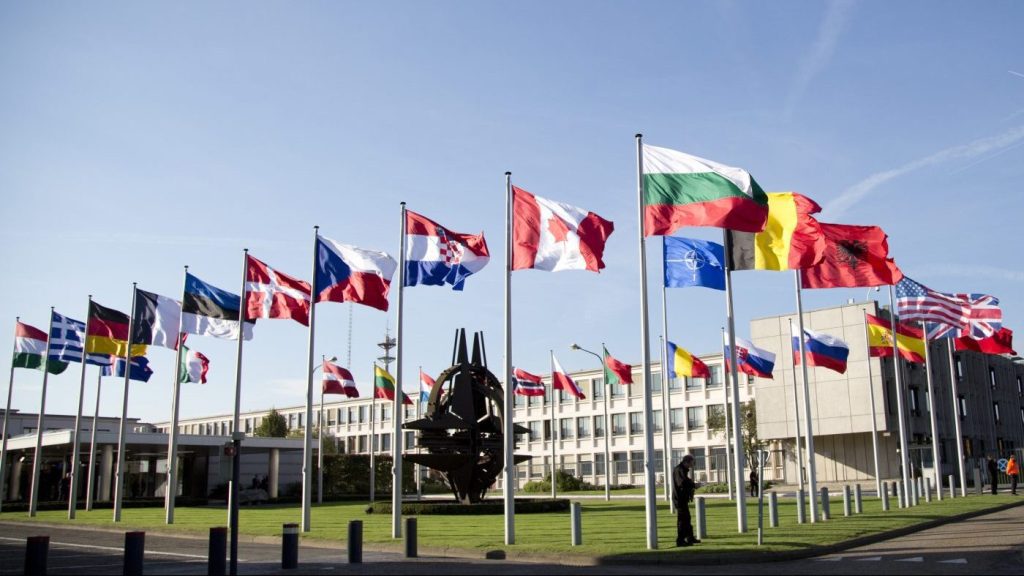Support from Americans for NATO and supporting Ukraine in its defensive war against Russia is decreasing, as reported in a survey that was released on Wednesday. survey published Wednesday by the Pew Research Center.
The Pew survey puts hard numbers behind divides playing out on Capitol Hill over support for Ukraine and attacks by former President Trump, the presumptive Republican presidential nominee, criticizing NATO countries as failing to share the burden of the security alliance.
In the last election, the role of the U.S. in the world, as a NATO member or on its own, will be a significant topic for voters, candidates, and debates, according to Moira Fagan, Research Associate with Pew.
These numbers really speak to that moment.(
While most Americans still support NATO (58 percent), there has been a 4 percentage point drop since 2023, which the authors say is a significant decline.
The partisan divisions are starker, with three-quarters of Democrats viewing the organization favorably, compared to only 43 percent of Republicans. This is a decrease from 55 percent in March 2022, one month after Russia's invasion of Ukraine.
These numbers have changed, with Republicans showing less support for Ukraine. At the beginning of the war in 2022, about half of Republicans felt the U.S. was not offering enough support to Ukraine, whereas only 9 percent said that at that time.
Now, about half of Republicans believe the U.S. is providing too much support to Ukraine, while 13 percent say not enough help is being given.
Democrats have largely stayed consistent in expressing that there is not enough support or that the level of support is about right.
The numbers indicate deep divisions among Republicans in Congress, as most House GOP members voted against a $61 billion security assistance package for Ukraine in April, which was delayed for months due to Republican opposition. The bill was eventually passed with Democratic support.
The Pew poll took place April 1-7, shortly before the House passed assistance for Ukraine. It surveyed 3,600 U.S. adults who are members of the center’s American Trends Panel, and respondents are recruited through national, random sampling of residential addresses.
Pew said the survey is weighted to be representative of the U.S. adult population by gender, race, ethnicity, partisan affiliation, education and other categories.
The survey also tested Americans’ knowledge of NATO, with a little over half (56 percent) correctly identifying Europe and North America as the two regions from which the alliance draws membership. Although Americans are confused over Ukraine’s relationship to the alliance, with 41 percent correctly identifying it as a non-member.
Those who are more knowledgeable about NATO are more likely to view the organization favorably, according to the report’s authors.
Fagan said the numbers show that there is no political divide in understanding NATO, indicating that Americans are generally well-informed about current events and important debate topics.
President Biden plans to hold the annual NATO summit in Washington in July, which will be the alliance's 75th anniversary. NATO allies see the summit as an important chance to show support for Ukraine, even though there is disagreement among members about Ukraine's future in the alliance.
While most Democrats and Republicans in Congress back U.S. participation in NATO, former President Trump has been focused on the alliance. He has threatened to withdraw the U.S. from NATO, hesitated to commit to the mutual-defense pact, and criticized member states for not meeting the alliance's defense spending goal of two percent of GDP.
No paraphrasing was done for this input string.
pass legislation in December seeking to bar any president from withdrawing from NATO, although skeptics view the law’s provisions as weak. No paraphrasing was done for this input string.
The Pew survey found that 88 percent of Americans do not have confidence in Russian President Putin to make the right decisions about world affairs.
But there are differences of opinion among Americans regarding their view of Ukrainian President Volodymyr Zelensky. At the start of Russia's full-scale invasion, Zelensky was seen as a brave wartime leader defending Ukraine against a larger, nuclear-armed Russia that had initiated an illegal invasion.
Over the past two years of war, Americans' favorability toward Zelensky, especially among Republicans, has decreased. While 48 percent of Americans have confidence in Zelensky to make the right decisions about world affairs, this represents an 8 point decrease since 2023. Only 34 percent of Republicans support Zelensky, compared to 65 percent of Democrats.
American support for NATO and aid to Ukraine is declining, according to a survey from the Pew Research Center. The survey also reveals disagreements between Democrats and Republicans on the issue.
“Since the war has broken out, we’ve seen that negative views of Russia, a lack of confidence in Putin, has really been quite stable,” Fagan said.
“But we do kind of see… views of NATO have dropped slightly over the past few years. In general, the public is less likely to be supportive of Ukraine aid… There’s a partisan divide: Democrats are more likely to say that helping Ukraine helps U.S. national security, Republicans say that hurts national security,” she continued.
“Some of this movement that we see is driven just by the declining support for NATO and Ukraine among Republicans, typically, while the Democratic numbers have remained a little bit more stable.”
American support is dropping for NATO and for backing Ukraine in its defensive war against Russia, according to a survey published Wednesday by the Pew Research Center. The Pew survey provides specific numbers behind the divisions over support for Ukraine and criticism from former President Trump, who is the presumptive Republican presidential nominee.









